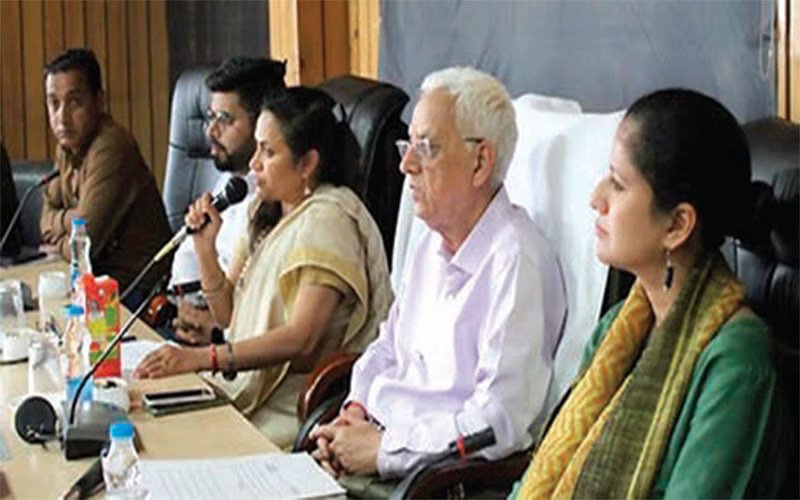Shaping Legal Evolution: The Role of the Law Commission of India
The Law Commission of India plays a vital part in shaping legal elaboration in our country. Established in 1955, the commission has been a colonist in the process of formulating and suggesting laws to the government for consideration. The commission’s accreditation is to examine being laws and to make recommendations for their reform or correction.
Through its colourful enterprise and reports, the Law Commission of India has been necessary in impacting legal elaboration in India, introducing new legal systems and making necessary variations in being bones . It continues to be an important body in the legal geography, and its benefactions should be confided.
1. The History and Function of the Law Commission of India 
The Law Commission of India has a rich and significant history, dating back to its establishment in 1955. It was created with the ideal of examining being laws and suggesting reforms or emendations to the government. Since also, it has played a vital part in shaping legal elaboration in India. The primary function of the Law Commission is to study and dissect the prevailing legal systems, identify gaps or inefficiencies, and propose comprehensive recommendations for reform.
These recommendations are presented in the form of reports, which serve as precious coffers for policymakers and lawgivers. The commission conducts in- depth exploration, engages with legal experts, and seeks public opinion to insure that its recommendations are well- informed and reflective of the requirements of society. Over the times, the Law Commission of India has accepted multitudinous systems and published reports on a wide range of legal issues.
These reports have covered different areas similar as felonious law, family law, executive law, and more. They’ve served as catalysts for legal reforms, guiding policymakers in making necessary changes to outdated laws and introducing new legal fabrics where needed. likewise, the Law Commission laboriously collaborates with colourful stakeholders, including the bar, academia, and legal interpreters, to grease effective perpetration of its recommendations.
It fosters dialogue and discussion, creating a dynamic platform for agitating and addressing pressing legal enterprises. The Law Commission of India has constantly strived to uphold the principles of justice, equivalency, and fairness in our legal system. Its part in shaping legal elaboration can not be understated.
By constantly examining and suggesting reforms, it ensures that our laws keep pace with the changing requirements and bournes of society. In the coming sections, we will claw deeper into the impact of Law Commission reports on legal reforms in India, exploring case studies of reforms initiated by the commission and agitating the challenges it faces in enforcing legal changes.
2. The Impact of Law Commission Reports on Legal Reforms in India
The impact of Law Commission reports on legal reforms in India has been substantial and far- reaching. These reports have served as important catalysts for change, furnishing precious perceptivity and recommendations that have led to significant advancements in our legal system. One key aspect of the Law Commission’s impact is its capability to identify gaps and inefficiencies in being laws.
Through scrupulous exploration and analysis, the commission has been suitable to pinpoint areas where the law falls short or fails to address pressing societal requirements. By pressing these failings in its reports, the commission effectively calls attention to the need for reform and provides a roadmap for addressing these issues. also, Law Commission reports have played a pivotal part in shaping legislative enterprise. Policymakers and lawgivers heavily calculate on these reports as authoritative sources of information and guidance.
The comprehensive exploration, expansive discussion, and expert opinions included in these reports insure that the recommendations put forth are well- informed and reflective of the requirements of society. The impact of Law Commission reports can be seen in colourful legal reforms that have taken place over the times. For illustration, the recommendations made by the commission on felonious law reforms led to the enactment of important legislation similar as the Criminal Law( Amendment) Act, 2013,
which aimed to enhance the safety and security of women in the country. also, the commission’s reports on family law have told the perpetration of laws concerning divorce, guardianship, and heritage. still, it’s important to note that enforcing legal reforms grounded on Law Commission reports can be gruelling . Political and regulatory hurdles, lack of coffers, and resistance to change can frequently hamper the process. Despite these challenges, the Law Commission continues to play a pivotal part in driving legal elaboration in India.
3. Case Studies exemplifications of Legal Reforms Initiated by the Law Commission
The Law Commission of India has a estimable track record of initiating legal reforms that have had a significant impact on our society. Let’s claw into some case studies to understand the concrete changes brought about by the commission’s recommendations. One notable illustration is the Criminal Law( Amendment) Act, 2013. In response to the rising incidents of sexual assault and violence against women, the Law Commission conducted an in- depth study and recommended comprehensive reforms to the felonious laws.
These recommendations led to the enactment of the Criminal Law( Amendment) Act, which introduced stricter corrections for offenses similar as rape, acid attacks, and stalking. The act also honoured new forms of offences like voyeurism and made vittles for substantiation protection. This legislation has played a vital part in enhancing the safety and security of women in our country. Another important area where the Law Commission has made a significant impact is family law.
In one of its reports, the commission recommended reforms to laws related to divorce, guardianship, and heritage. These recommendations handed guidance to lawgivers in making laws that aim to cover the rights and interests of individualities involved in family controversies. As a result, we’ve witnessed the perpetration of laws that address issues similar as women’s right to property, child guardianship, and conservation, promoting gender equivalency and justice.
These case studies demonstrate how the Law Commission’s reports have been necessary in bringing about much- demanded changes in our legal system.They reflect the commission’s commitment to icing that our laws are in line with the evolving requirements and bournes of our society. still, it’s essential to admit that enforcing legal reforms grounded on these reports can be grueling . Political will, regulatory hurdles, and resistance to change frequently pose significant obstacles. nevertheless, the Law Commission’s fidelity and continuity in driving legal elaboration continue to be estimable.
4. Challenges Faced by the Law Commission in enforcing Legal Reforms
Enforcing legal reforms grounded on the recommendations of the Law Commission of India can be a gruelling task. Despite the commission’s sweats to propose well- delved and well- informed reforms, colourful obstacles hamper the smooth perpetration of these changes. One significant challenge faced by the Law Commission is the lack of political will and commitment to bring about legal reforms. In numerous cases, politicians prioritise other pressing issues or are reluctant to legislate changes that may be unpopular or controversial.
This lack of support from the government can significantly delay or indeed help the perpetration of important- demanded reforms. Regulatory hurdles also pose a significant challenge. The process of drafting and making legislation can be complex and time- consuming. Detainments in carrying blessings from different departments and regulatory red tape recording can decelerate down the perpetration process. also, limited coffers allocated to the commission can hamper its capability to carry out its work effectively.
Resistance to change within the legal and judicial system is another handicap. Traditional practices and settled interests can be resistant to espousing new legal fabrics or modifying living bones . This resistance can stymie the smooth perpetration of reforms recommended by the Law Commission. also, the sheer magnitude of legal reforms needed in a country as vast and different as India presents a considerable challenge. The commission’s recommendations frequently involve expansive changes to being laws, which bear collaboration and collaboration among multiple stakeholders.
icing agreement among policymakers, lawgivers, and other applicable parties can be a daunting task. Despite these challenges, the Law Commission continues to push for legal reforms and play a vital part in shaping legal elaboration in India. sweats to overcome these obstacles, similar as increased public mindfulness and advocacy, strengthened collaboration with stakeholders, and continued exploration and discussion, are essential in icing the successful perpetration of reforms. The commission’s perseverance and determination to address these challenges are pivotal in driving forward legal elaboration in the country.
5. The Future of Legal elaboration and the Law Commission’s Role
As we look to the future, it’s clear that the Law Commission of India will continue to play a vital part in shaping legal elaboration in our country. With its rich history and significant benefactions, the commission has established itself as a crucial institution in our legal geography. In the coming times, the Law Commission’s part will come indeed more critical as our society continues to evolve and face new legal challenges. Rapid technological advancements, changing social morals, and arising issues will bear nonstop reform and adaption of our legal system.
The Law Commission will need to proactively identify and address these challenges to insure that our laws remain applicable and effective. It must engage in thorough exploration, consult with experts and stakeholders, and give well-informed recommendations to address arising legal issues. This will bear raised collaboration with the government, bar, academia, and civil society associations. likewise, the Law Commission must embrace innovative approaches to attack complex legal problems. It should work technology to enhance access to justice, streamline legal processes, and ameliorate effectiveness in the administration of justice.
By embracing digitization and exploring indispensable disagreement resolution mechanisms, the commission can contribute to the development of a more accessible and effective legal system. To overcome the challenges of enforcing legal reforms, the Law Commission must also concentrate on erecting public mindfulness and support.
By laboriously engaging with the public through consultations, public juggernauts, and educational enterprise, the commission can induce instigation and make a agreement for necessary legal changes. Overall, the Law Commission’s part in shaping legal elaboration in India is pivotal and will continue to be so in the future. As we navigate the complications of an ever- changing society, the commission’s commitment to justice, fairness, and equivalency will guide us towards a legal system that truly reflects the requirements and bournes of our different nation.
Conclusion
In summary, the Law Commission of India has played a vital part in shaping legal elaboration in our country. Since its establishment in 1955, the commission has diligently examined being laws, linked gaps, and proposed comprehensive reforms through its reports. These reports have had a significant impact on legal reforms, leading to advancements in our legal system and addressing pressing societal requirements.
The commission’s reports have served as important catalysts for change, guiding policymakers and lawgivers in making important legislation. exemplifications similar as the Criminal Law( Amendment) Act, 2013, which enhanced the safety and security of women, and reforms in family law that promote gender equivalency and justice demonstrate the palpable impact of the Law Commission’s recommendations.
Also Read : The Advantages of Choosing Arbitration over Lengthy Litigation
Also Read : 5 uses of penetration testing uses











